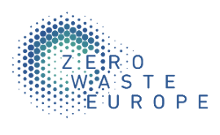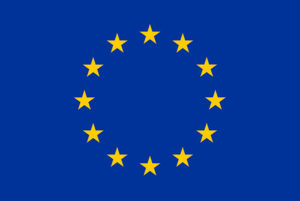ABOUT
Opportunities and challenges of zero wasteAlthough we live in a planet of finite resources, global extraction of resources continues to increase. The European Union is the world’s region with highest dependency on natural resources imports; from precious metals to the water or land necessary to produce every product we consume.
At the same time, our linear “take-make-waste” economic model results in a staggering amount of materials being thrown away. Every European generates 481 kg of municipal waste per year – twice as much as we generated 40 years ago.
Moreover, industry is locked into design and production systems that result in huge amounts of waste, products filled with toxins, difficult to disassemble, repair, reuse or recycle. With 80% of environmental impacts determined in early design, waste exemplifies that these considerations have not yet been addressed effectively.
Today, 60% of the waste we generate still goes directly into landfills or incinerators and only 40% is separately collected for recycling and composting.
The negative impacts of these practices are evident and dramatic. Plastic waste constitutes between 60% and 80% of marine debris and is “one of the world’s most pervasive pollution problems,” according to the UNEP. While increased collection and recycling has a role to play, redesign represents an essential avenue of responding to this problem.
Hence, Europe finds itself at a crossroad as regards its production and consumption model. The unsustainability of the current system is not only ecological but also social and economical and the necessity to reinvent the system has shaped the Circular Economy strategy.
The future for a Europe that fully embraces zero waste and the circular economy is one where materials and energy are kept in the system for as long as possible and resources are preserved rather than thrown away.
European cities such as some of the progressive zero waste municipalities have taken on these challenges implementing innovative new systems which have drastically increased recycling rates, whilst lowering residual waste generation. Other cities such as Roubaix, France have supported zero waste lifestyle initiatives, helping low-income families and citizens to reduce their expenditure whilst also reducing their waste generation. These examples demonstrate just two of the ways in which cities across Europe are rising to the challenges presented by this throw-away, consumer culture.
Across Europe pioneering designers are working on projects which buck the trend against ‘planned obsolescence’ and wasteful packaging. These plans aim to tackle waste at its source eliminating such ‘bad design’ from ever entering the supply chain. From the ‘Museum of Bad Design’ in Capannori to the ‘People’s Design Lab’ innovative practitioners have been highlighting poor product design and proposing alternative ‘zero waste’ solutions.
All of these initiatives along with countless others are capitalising on the opportunities of change which are present in a European Circular Economy. Their examples are leading the way for policy makers at a local, regional and European level as examples of zero waste and the circular economy in Practice.
Why Madrid?
Waste management has become a hot topic in the capital, with a significant increase in citizen and institutional action committed to introduce improvements in the waste management system.
First, the Clean Air – Zero Waste Madrid Platform (a member of the Zero Waste Europe network) has published the Alternative Proposal for the Management of Municipal Waste in the Community of Madrid (the regional government) based on the principles of Zero Waste. Moreover, there is an increasing number of projects, groups, and municipalities interested in developing and implementing Zero Waste experiences.
At the same time, institutions are awakening. On the one hand, the Government of the Community of Madrid is developing the Strategy for the Sustainable Management of Waste in the Community of Madrid (2017 – 2024). At the local level, the City of Madrid is making its own Waste Management Planning. In both cases, the Clean Air – Zero Waste Madrid Platform has defended the development of waste policies based on the principles and successful experiences of Zero Waste, with emphasis on the need to phase out incineration and other bad practices.
That is why this year Madrid has become a strategic place for the necessary change of model in waste management in the region of Madrid. We also hope that the drive towards Zero Waste in Madrid will be a seed that will give rise to other improvements in the rest of the country.
We are delighted to invite you to participate in the Conference “The Solution: Zero Waste” and to learn about the very significant zero waste experiences being carried out at local and national level, together with institutional representatives, experts and organizations from all over Europe that are working for a more sustainable world, toxics-free and based on Zero Waste.
Welcome to Madrid!
Who should attend?
All actors involved in prevention and management of residual municipal waste such as municipalities, waste management companies, recycling companies, ministries representatives, companies involved in social economies initiatives, public institutions, development agencies and local action groups (grassroots movements), NGOs, individuals and activists.
What will the conference look like?
The conference “Solution: Zero Waste” presents the vision and the implementation of the Zero Waste strategies, through the most innovative and successful experiences at both the European and national level.
The conference will consist of general presentations of both global and local visions of Zero Waste. In the second part of the conference, we will analyse the importance of the separate collection of organic waste as an essential tool to achieve Zero Waste and we will explore the related European and local experiences. In the third part, we will investigate the benefits from repair and reuse, which are far higher than the those of recycling. We will also talk about the responsibilities of the producers and their role in the prevention, management and utilization of implementing systems of disposal for packaging, which will be the focus in the 4th part of the conference.
Lastly, in the fifth part of the conference we will explore the realities of European Zero Waste municipalities, the Madrid Waste Plan and virtuous initiatives such as agricultural farming and urban gardens network.
After the conference has taken place, on April the 1st, 2nd and 3rd we will be holding the Zero Waste Europe General Annual Meeting.
Organisers
Zero Waste Europe
Zero Waste Europe was created to empower communities to rethink their relationship with resources. In a growing number of regions, local groups of individuals, businesses and city officials are taking significant steps towards eliminating waste in our society. Zero Waste Europe engages these groups at two levels: Supporting local groups with independent knowledge and streamlined tools to drive change more efficiently, Structuring the movement internationally to better represent the interests of our communities at the EU level and engage policymakers with a unified voice. We are both a knowledge network and an advocacy group, representing active communities in countries across the EU. We want to redesign our society so that all superfluous waste is eliminated and everything that is produced can be reused, repaired, composted or recycled back into the system. Anything that can’t be repaired, composted or recycled should be re-designed and replaced or banned from entering the market.
Plataforma Aire Limpio – Residuo Cero Madrid
They are composed of a wide range of civil society organisations, from environmental NGOs to trade unions and neighbourhood associations works for the protection of the environment in the Community of Madrid in general and in the southeast region in particular. Over the years since 2000, this network has been a focal point of resistance to environmental damage in the area against the creation of hazardous waste projects, harmful waste facilities and plans primarily in the Southeastern region of Madrid. While these facilities are dismantled, an alternative to the current waste treatment- a Zero Waste policy is promoted that It should be implemented in all municipalities of the City of Madrid.
Friends of the Earth Spain
Friends of the Earth Spain: we are a non-profit environmental NGO with the mission of promoting local and global change towards respectful society with the environment, justice and solidarity. We are a group of people who advocate social and environmental justice. We strongly believe that the center of politics must be people and the Earth. We work from the local to the global, for the construction of a socially and environmentally committed citizenship, within the framework of an active participation in the Federation of Friends of the Earth International, with more than one million members in more than 70 countries of the five continents.
Ecologists in Action
Ecologistas en Acción is a confederation of more than 300 environmental groups distributed by towns and cities. It is part of the so-called social ecologism, which understands that environmental problems have their origin in an increasingly globalized production and consumption model, from which other social problems also derive, and which must be transformed if the ecological crisis is to be avoided.
To this end, it carries out awareness campaigns, public or legal denunciations against actions that damage the environment, while developing concrete and viable alternatives in each of the areas in which it carries out its activity.

